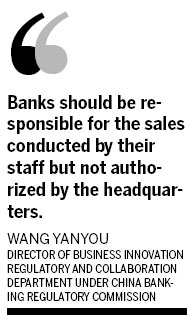Apply unified standards to wealth management products
Updated: 2013-01-30 10:17
By Wang Xiaotian (China Daily)
|
|||||||||||
Unified standards and concerted regulation should be applied to wealth management products sold by non-banking institutions, otherwise risks might match those generated by banks and cause a shock this year, a senior banking regulator warned on Tuesday.
"Not only banks, but insurance and securities companies are also able to sell wealth management products, which raises great challenges for financial regulation," said Yan Qingmin, assistant chairman of the China Banking Regulatory Commission.
|
 |
Wealth management products are similar to time deposits, but the interest rates can be set freely by financial institutions, and many of the assets and liabilities stay off the balance sheets, adding to concerns over fast-expanding shadow banking activities in recent years.
These products usually require a minimum investment of 50,000 yuan ($7,900). The capital from buyers often goes into bonds, loans and company projects.
The commission also plans to further strengthen regulation over banks' issuance of wealth management products this year to prevent risks from spreading, Yan said.
"The focus this year should be to prevent banks from operating products with different risk levels in the same capital pool, and make sure they use separate accounts for products with fixed and non-fixed income," said Wang Yanyou, director of the commission's Business Innovation Regulatory and Collaboration Department.
The amount of outstanding wealth management products was at about 7.4 trillion yuan in January, accounting for about 5 percent of the banking business, and the products issued last year generated an average yield of 4.1 percent, according to Wang.
He said the commission has asked banks to investigate their selling of such products for other institutions, such as trust companies, before submitting reports, and is trying to set up a unified system for the issuance of the products.
A Shanghai branch of Hua Xia Bank failed to pay promised returns to buyers of a $22.47 million wealth management product when the product matured in late November.
Fitch Ratings said earlier that the issuance of such products poses growing risks to the banking sector, as many of the assets and liabilities spend much of their life off balance sheets.
Unlike in previous years, recent issuance has been driven mainly by non-State banks, and turnover is high with about three-fourths of products maturing within six months, which adds to uncertainty of repayment, Fitch said.
Due to rising risks that most of the capital of such products was put into long-term projects and could not be repaid in the short term, in 2011 the regulatory commission ordered banks to halt sales of wealth management products with a maturity of less than a month.
The recent controversy over Hua Xia Bank's product highlighted the rising operational risks incurred in selling some of these investment products to investors, the regulators said.
"Banks should be responsible for the sales conducted by their staff but not authorized by the headquarters," Wang said.
The product in question was originated by a third-party investment company and was not a wealth management product issued under Hua Xia's name, yet the bank is still being held implicitly liable.
"Authorities must be alert and prevent off-balance sheet risks from spilling over. Wealth management products are becoming invisible debt on banks' balance sheets," said Ba Shusong, deputy director of the Finance Research Institute at the Development Research Center of the State Council.
wangxiaotian@chinadaily.com.cn
Related Stories
Investment channels to be expanded 2012-12-28 10:49
Construction Bank accused of misleading buyers 2012-12-27 14:14
High-net-worth individuals 'want better banking' 2012-12-24 10:15
Private banking for rich 'faces golden era' 2012-12-24 09:48
Default exposes risks in wealth management market 2012-12-08 17:23
Regulators 'need to step cautiously' 2012-10-08 10:59
Today's Top News
President Xi confident in recovery from quake
H7N9 update: 104 cases, 21 deaths
Telecom workers restore links
Coal mine blast kills 18 in Jilin
Intl scholarship puts China on the map
More bird flu patients discharged
Gold loses sheen, but still a safe bet
US 'turns blind eye to human rights'
Hot Topics
Lunar probe , China growth forecasts, Emission rules get tougher, China seen through 'colored lens', International board,
Editor's Picks

|

|

|

|

|

|





